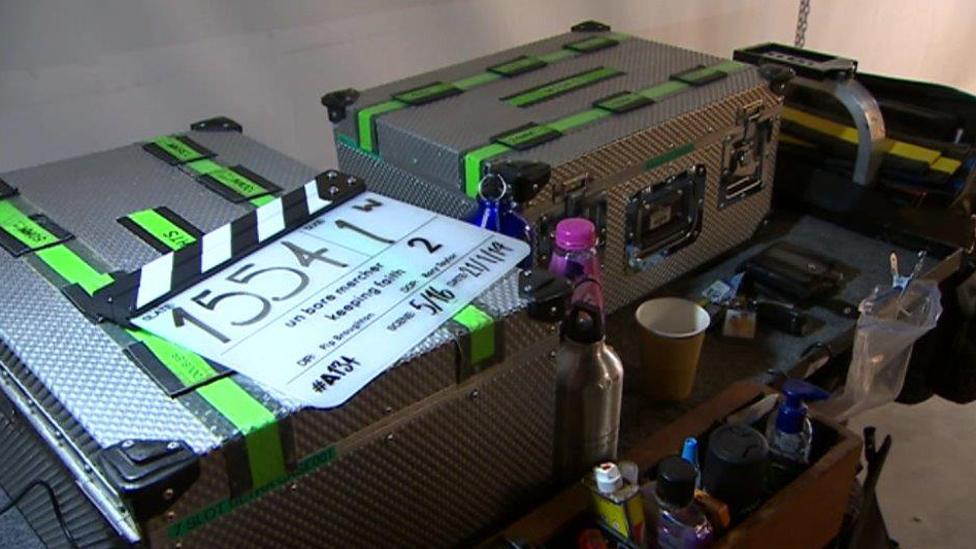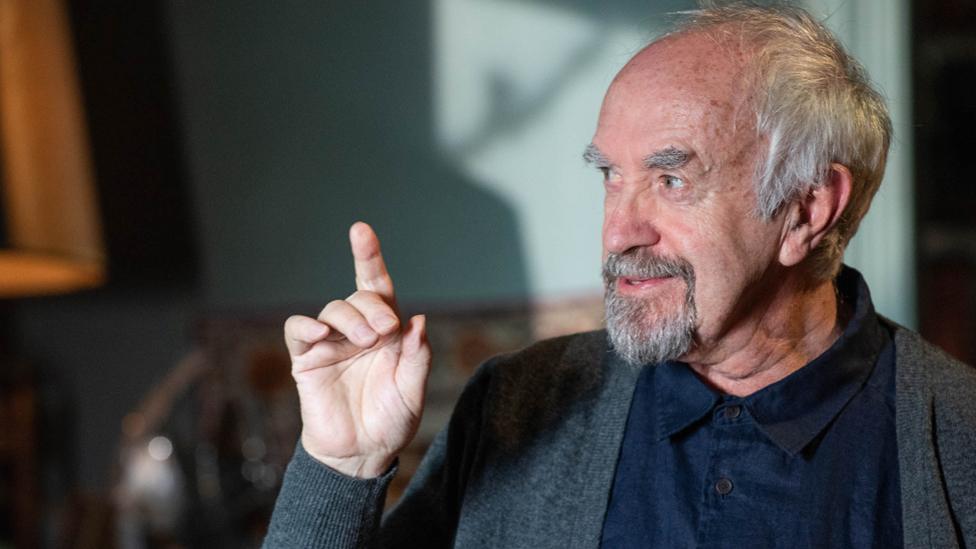Film and TV industry in Wales 'needs new strategy'
- Published
Keeping Faith star Eve Myles says the industry is "really vibrant"
The growth of Wales' film and TV industry risks "losing momentum" without further government support.
An assembly inquiry has called for a new strategy to help sustain the boom in productions.
The culture committee said greater support needed to be given to the "indigenous" film and TV industry, ensuring Welsh crews benefited from government investment.
The Welsh Government said it would respond to the report in due course.
The committee began investigating government support for film and TV last year and took evidence from broadcasters, producers, actors and academics, as well as ministers and their officials.
Among its recommendations, the committee's report calls on the government:
To create a strategy for continued growth in productions
Stronger requirements for Welsh crews to be employed by producers receiving government support
To consider a quota for using local on-screen talent.
But the need to increase the number of skilled crews was an issue raised regularly by industry representatives in their evidence to the committee, and in its report it recommends that a new government body called Creative Wales focuses on improving skills when it launches later this year.
The report states that "there is a danger of losing momentum if we do not have sufficient skilled workers to support our growing screen industry."
In numbers
£187meconomic value - gross value added
58,000estimated to work in sector
2,900jobs created or supported since 2010
£105minvestment in sector since 2010
Committee chair Bethan Sayed said the benefits of the government's investment in film and TV needed to be maintained.
She said: "We don't dispute that a lot has been done in Wales to develop the creative industries, and lots of companies are investing their time and effort to developing talents in Wales.
"But we also know there are huge gaps in skills here in Wales, and companies are having to take it upon themselves to develop that in the absence of a Welsh government skills strategy."
The committee heard evidence that government investment in film and TV had made a positive economic impact, but called for greater transparency following the government's controversial relationship with Pinewood Studios.
Its report also calls on the government to do more to ensure "indigenous" production companies and crews were benefitting from investment in the creative industries.
The government's support for productions requires companies to spend a certain proportion of its budget in Wales, but committee chair Bethan Sayed said in practice it was unclear whether Welsh crews and businesses were really benefiting.
She said: "At the moment, 'Welsh spend' is not really clearly defined, and many companies and agents have come to me and said we need to have a clearer definition of that.
"For example, some big companies from abroad may come here and use catering crews that are not local, or may use cast that are not based in Wales.
"Of course, that is their discretion, to an extent. But if we did build in incentives, or quotas, to the mix, how would that look?
"And how would that change the landscape for the Welsh economy in relation to the creative industries."

Production of Keeping Faith/Un Bore Mercher
One of the most recent productions to complete filming in Wales is the second series of Un Bore Mercher, or Keeping Faith, which is currently being broadcast on S4C and will launch on BBC One later this year.
Its star Eve Myles said it was impossible to miss the huge growth in Welsh productions.
"You can't pass a lamppost without seeing a location sign on it, and productions from all over the world are choosing Wales as their backdrop."
"So it has certainly become really vibrant. And, yeah, it is very exciting to be part of a show that is worldwide but doesn't pretend to be anywhere else, other than Wales itself."
S4C began broadcasting the second series of the show on Sunday and Myles said Wales had a global reputation as a desirable filming location.
Series producer Gwenllian Gravelle, who will shortly join S4C as its new drama commissioner, said a high proportion of its crew was Welsh but said there was an industry shortage of skilled workers.
"It is quite difficult because we are all trying to fight to get the crews," she said.
"There are lots of production companies from Britain and abroad here, because of the wonderful locations we have, as well as the quality of the crews and the performers.
"That's a good place to be, I think. But what we need to do is look to the future and try to make sure we think of the next generation of directors of photography, of sound, of costume and make-up, so that we have a bigger pool of people to supply and make these wonderful dramas in idyllic places like south Wales."
- Published4 February 2019

- Published5 November 2018

- Published9 October 2018

- Published7 March 2018
